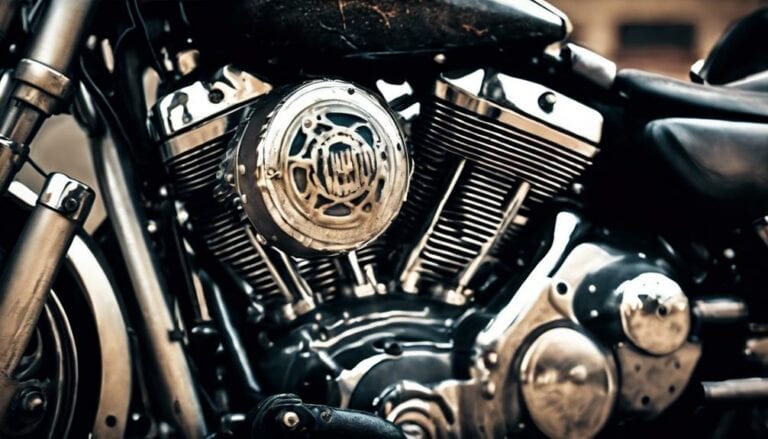When you hear a Harley-Davidson approaching, that distinctive ragged sound is not by chance. The intricate interplay of engine components and combustion processes is what gives these motorcycles their unique auditory identity.
From the V-Twin configuration to the cam timing and exhaust system design, each element contributes to the symphony of growls and rumbles emitted by a Harley on the move.
Understanding the science behind this iconic sound may just deepen your appreciation for these legendary machines.
Key Takeaways
- Raggy sound in a Harley can result from cam timing issues affecting valve operation.
- Understanding the V-Twin firing intervals and exhaust system design is crucial.
- Engine displacement plays a significant role in shaping the distinctive Harley exhaust note.
- Aftermarket exhaust modifications, like different muffler designs, can alter the sound profile.
The Anatomy of Harley Exhaust System
The Harley exhaust system comprises headers, a crossover pipe, and mufflers, essential components that significantly influence the bike's sound output. When your pistons move up and down, powering your ride, the connecting rods transfer that energy to your crankshaft. As the exhaust valves open, the pistons push the burnt fuel mixture out of the cylinders. This process creates pressure waves that travel through the headers and into the crossover pipe. The design of these components, along with the mufflers, determines how these pressure waves interact, ultimately shaping the sound that your Harley produces.
In the realm of Harley customization, riders often seek to enhance both performance and aesthetics, with the exhaust system being a prime target for modification. Different muffler designs, such as slip-ons or full systems, can alter the sound profile of your bike. By understanding the intricate relationship between pistons, connecting rods, and the exhaust system, riders can fine-tune their Harley's sound to match their desired level of freedom on the road.
Understanding the V-Twin Engine Configuration
With its V-Twin engine configuration, a Harley Davidson produces its iconic raggy sound, a result of the firing pattern unique to this design. The V-Twin layout consists of two pistons arranged in a V shape, leading to distinctive firing intervals that contribute to the recognizable exhaust note.
As the engine operates, the firing order dictates when each cylinder ignites fuel, creating uneven combustion cycles. This uneven firing sequence results in a rhythmic 'potato-potato' sound that enthusiasts associate with Harley Davidson motorcycles. The V-Twin design also influences the timing of the exhaust valve opening, further shaping the character of the sound produced.
Impact of Aftermarket Exhaust Modifications
Upon modifying the exhaust system of a Harley Davidson, the sound profile can be significantly altered, affecting both volume and tone. Aftermarket exhaust modifications like changes to exhaust pipes, baffles, or mufflers can result in a louder and deeper sound. Some aftermarket exhaust systems not only change the sound but are also engineered to enhance the bike's performance. Different designs such as straight pipes or slip-on mufflers can influence the Harley's exhaust note characteristics. It is crucial to bear in mind local noise regulations and the potential impact on the overall engine performance when considering these modifications.
| Impact of Aftermarket Exhaust Modifications | |
|---|---|
| Sound Profile | Altered |
| Volume | Louder |
| Tone | Deeper |
Role of Cam Timing in Engine Sound
Cam timing significantly influences the engine sound of a Harley Davidson motorcycle. When it comes to engine sound, the precision of cam timing is paramount. Here's how cam timing affects the raggy sound you may hear:
- Timing Precision: Proper cam timing ensures the intake and exhaust valves open and close at the precise moments, influencing the engine's sound quality.
- Misfiring Prevention: Incorrect cam timing can lead to misfiring, causing irregular combustion and contributing to a raggy sound.
- Diagnostic Indicator: A raggy sound in a Harley Davidson engine may indicate cam timing issues, signaling potential problems with the timing chain or tensioner.
Understanding the role of cam timing in engine sound is crucial for maintaining optimal performance and sound quality in your Harley Davidson motorcycle. Addressing any cam timing concerns promptly can help prevent further engine damage and ensure a smoother riding experience.
Influence of Engine Displacement on Sound
Engine displacement plays a crucial role in shaping the distinctive sound signature of a Harley Davidson motorcycle. The size of the engine, determined by the total volume swept by all the pistons in the cylinders as the crankshaft completes two separate rotations, directly impacts the exhaust note produced. Larger engine displacements, like those found in Big Twin models, lead to deeper and more resonant tones that contribute to the iconic rumble and growl associated with Harley Davidson bikes.
The pistons connect to the crankshaft, and as displacement increases, the power output and torque delivery also rise, influencing the overall sound profile of the motorcycle. Riders often select Harley Davidson motorcycles with specific engine displacements to achieve the desired combination of sound and performance characteristics. A higher engine displacement typically results in a louder and more distinctive exhaust note, enhancing the auditory experience and contributing to the unique identity of Harley Davidson motorcycles.
Conclusion
In conclusion, the distinct rumbling sound of a Harley-Davidson motorcycle is a result of its unique engine design and firing sequence. The V-Twin configuration, aftermarket exhaust modifications, cam timing, and engine displacement all play a role in creating the signature 'pop-pop…pop-pop' sound that sets Harley bikes apart.
Remember, when it comes to Harley-Davidson motorcycles, it's not just about the ride, but also about the music they make on the road.

